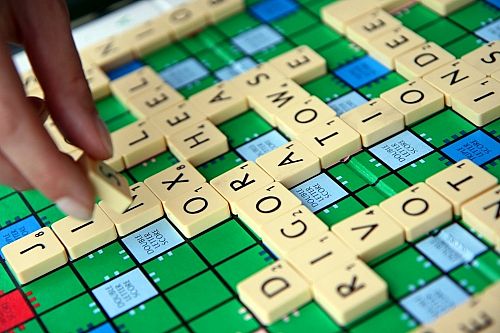Now let’s face it: vocabulary book is the culprit.
More than 90% of the vocabulary books do not have English definitions for the words, and learners can only remember the Chinese meaning. This phenomenon poses a threat to learning even if learners remember the meaning correctly as printed. Apparently, there are unbridgeable discrepancies between Chinese and English, and some English words are impossible to translate into a simple Chinese word or phrase. Thus, knowing the Chinese will not help but harm one’s learning!
The most important point is: learning vocabulary is a step — a crucial step — in learning a language. It is commonly accepted that a language requires a person to listen, speak, read and write. Therefore, vocabulary learning should serve nothing but these purposes. 63.74% of students who took the survey as part of my research project responded that the biggest problem with the vocabulary books is that they do not show how to use the words. 50.41% said that vocabulary-building helped them with writing, but 80.99% believed that it should help them with writing. That is a 30.58% gap, which means that at least 30% of students in my school, representing perhaps the top English level among Chinese high schools, are not getting what they want from learning vocabulary! Besides “forgetting,” “unable to apply the words in writing” is the most popular choice, which 56.20% of responders have selected.
After all, the failure of the vocabulary books and the vocabulary obsession is self-evident. Writing is a creative process, while learning vocabulary is largely passive. To apply knowledge, one has to become aware that he or she is taking the lead, not led by the nose. This is why the conventional vocabulary learning techniques fail time after time, case after case. What’s important is the language, not the words themselves, and as long as the learner gets little incentive for using the words, the teaching — the teaching of a language — fails terribly.
I staunchly believe that there is simply nothing better than reading when learning a language. When you encounter a new word while reading, you are dying to know what it means, and here is the initiative that so many other vocabulary learners lack!
This is my way of learning vocabulary, of course, but while it sounds easy, it is extremely hard to follow. None of those who have listened to my advice ever did what I told them to do.
It is hard to imagine how painfully slow this method of learning can be. To achieve ultimate betterment in your English abilities, it is needful that you check every word that you are uncertain of while reading, which means that even if you have seen the word a dozen times, you still have to look it up in the dictionary when you cannot figure out how this word is used in the sentence.
“Put away the vocabulary books,” I now say to my friends. “Grab an English book and read.”
Unfortunately, the vocabulary obsession still goes on.
现在就让我们来与词汇书这个罪魁祸首来个正面交锋。
百分之九十以上的单词书都没有单词的英文释义,所以学生只能去记忆中文意思,但是即便学生正确无误地记住了中文解释,这样的记忆单词的方式还是留下了日后的隐患。因为很显然中文和英文之间有一些无法直接转换,只可意会不可言传的矛盾与差异是无法调和的。英文里有些字眼儿的意思就是无法用中文来表达,所以记住中文释义对于英语学习不但没有帮助,反而还有坏处。
最重要也是最需要强调的一点是学习词汇是学习语言的一个步骤,是至关重要的一步。被广泛接受的观点是语言的学习包括听说读写四个方面。所以词汇的学习所服务的方向就只应该也仅限于听说读写。参与我的研究项目调查的学生里,有63.74%的人反映说词汇书最大的问题就在于没有告诉他们该如何使用这些单词。另外有80.99%的人认为词汇的积累应该对写作的提高有所帮助,但是却只有 50.41%的人反映词汇的构建确实让他们的写作水平有所提高。这样看来,就有一个30.58%的差异,而这就意味着在我们学校的这群也许代表着中国高中英语最高水平的学生中,有至少百分之三十的人没有从背单词中获得他们想要的收获。在我们的调查问卷中,除了"忘记"这一项以外,最受"青睐"的就属"不知道如何在写作中使用"这一项了,有56.20%的人选择这一项。
所以单词书的无用和对单词记忆错误的幻想是不言而喻的。写作是一个创作和思维发散的过程,但是记忆单词却被动地多了。想要运用知识就必须学会主动,而不是被人牵着鼻子走。这就是为什么传统的死记硬背单词的方法和技巧一次又一次地失败和效率低下的原因了。更重要的是语言本身而不是单词的问题,如果学生本身根本对使用单词这些单词没有兴趣或者一点儿都不积极的话,那么这样的语言教学就太失败了。我始终认为在学习语言上没有什么比阅读更有效更好的方法了。在阅读的过程中,如果遇到了不懂的单词,你会很迫切的想知道这个单词的意思,而这种动机正是很多学英语的人都缺乏的。
这就是我学习英语的方法,尽管听起来很容易,但其实坚持起来很难。在所有采纳我建议的人中,没有一个人能够按照我说的那样去做。
很难想像也很难接受这样学习英语的过程有多么的难熬。想要在英语学习上有质的飞跃,这就需要你在阅读过程中只要碰到不明白的的地方就要立刻去查字典,即使有的单词你已经见过十几次了,但是只要在某一句话中,你不知道它的用法,你就得去查。
"扔掉你的单词书"这是我现在对我的朋友们要说的话。"拿起一本英文读物,认真地阅读吧。"
但很不幸的是,对单词的错误痴迷还在延续,蔓延着。


